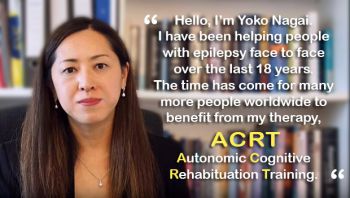World-first digital therapy for epilepsy
By: Tom Furnival-Adams
Last updated: Monday, 21 December 2015

A neuroscientist at Brighton and Sussex Medical School (BSMS) is raising money through a crowd fund campaign to complete development of a digital form of behavioural therapy for epilepsy.
The promising therapy, which until now Dr Yoko Nagai has been carrying out ‘in person’ with patients who are resistant to drugs, teaches them to train their brains to be more ‘alert’.
More than half of patients taking part in a clinical trial to test this personal therapy reported a reduction in the frequency of their seizures by 50% or more.
For Michael Meredith, from Brighton, learning the technique has meant he is seizure free for the first time since developing epilepsy six years ago.
“My epilepsy more or less came out of the blue,” he says. “Despite being on medication for the past six years, I continued to have between three and six seizures a month. I lost my driver’s licence, and as a self-employed carpenter this had a huge impact on my work.”
Dr Nagai’s therapy, ‘Autonomic Cognitive Rehabituation Training’ (ACRT), uses both physiological and psychological approaches to develop skills to control epileptic seizures.
ACRT allows people like Michael to see how their body responds to their thinking and emotion. By receiving visual feedback about how their body reacts, they are then able to train themselves to become more sensitive to their bodily reactions and control their body’s state of alertness. This ‘alertness’ actually helps patients to calm their brain, reducing the incidence of seizures.
Michael learned to use biofeedback with Dr Nagai in November 2014. He says: “It was like playing a computer game but using your mind and body rather than controls – with two electrodes on your fingers to measure the biofeedback. You have to drive along an animation, to reach a goal.
“The first time it was quite tricky, but after a few sessions I really got the technique. Now I’m very happy to be seizure free, and I even hope to reapply for my driver’s licence shortly.”
Dr Nagai’s research has attracted over £300,000 in scientific research grants, including funding from major UK grant body Wellcome Trust.
In 2005 she also started a private clinic at the National Hospital for Neurology and Neurosurgery, where she treated patients outside of her research; the clinic is now re-located in Brighton.
Dr Nagai says: “Although I have been helping people with epilepsy face-to-face over the last 15 years, my frustration was only a few people can be treated at a time.
“I am very motivated to be able to disseminate my therapy to many more patients who can benefit from this noninvasive, effective, accessible and affordable therapy.”
Find out more about how you can contribute to the crowd funding campaign.
BSMS is a partnership between the Universities of Sussex and Brighton with the NHS.

